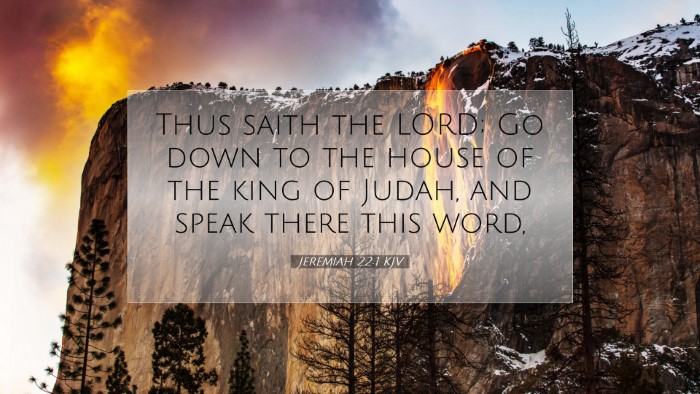Commentary on Jeremiah 22:1
Verse Analysis: Jeremiah 22:1 states, "Thus saith the LORD; Go down to the house of the king of Judah, and speak there this word."
This passage occurs within a significant prophetic context where God directs Jeremiah to confront the ruling powers of Judah. The prophetic call underscores both the urgency and the responsibility placed upon Jeremiah as His messenger.
Contextual Background
Jeremiah, often referred to as the weeping prophet, prophesies during the decline of the Kingdom of Judah. His message primarily revolves around the imminent judgment due to the nation's unfaithfulness to God. Chapter 22 can be seen as a warning not only to the monarchy but also to the leaders and people who bear witness to Judah's unfaithfulness.
Historical Setting
- Judah's Political Landscape: At this time, the monarchy was plagued by corrupt leadership and moral decay, impacting the entire population.
- The Role of Prophets: Prophets like Jeremiah served to remind the king and the nation of their covenant obligations and the consequences of their actions.
Insights from Commentaries
Matthew Henry's Commentary
Henry remarks on the specific directive given to Jeremiah to visit the house of the king. He suggests that this visit signifies the seriousness with which God views the disobedience of the leaders. God's command to Jeremiah reinforces the principle that leaders are held to a higher standard due to their influence and responsibility.
Leadership Accountability
- According to Henry, the essence of prophetic ministry is to confront power and remind it of its responsibility before God, which is crucial for maintaining a godly society.
- He further emphasizes that God's judgment is not just for the common people but also directed at those in power, highlighting that even kings must heed divine guidance.
Albert Barnes' Commentary
Barnes emphasizes the concept of divine exhortation. He interprets God's command to Jeremiah as an act of deep concern for His people and an invitation for repentance. The intended message through Jeremiah to the king is not merely a threat but an opportunity for correction.
The Role of Warning
- Barnes points out that the prophetic word serves as a corrective measure. It’s a divine warning intended to steer rulers away from paths of destruction.
- This commentary also highlights the providence of God, where even a single message can pivot the heart of a king toward righteousness.
Adam Clarke's Commentary
Clarke explores the theological implications of God’s command. He notes that the visit to the king's house symbolizes God’s relentless pursuit of the hearts of men, particularly those in authority. Clarke implies that God's desire to communicate is rooted in His character of love and justice.
Theological Implications
- Clarke argues that every prophetic utterance should be viewed as an act of divine love; God desires His people to turn back to Him.
- He stresses that the house of the king, which represents authority, is crucial in understanding how God's message permeates all levels of society.
Practical Applications
From this verse and the insights gathered from various commentators, several practical applications emerge for today’s readers, including:
- Responsibility of Leaders: Those in leadership should be held accountable to God’s standards, reminding them of the heavy weight of their positions.
- Heeding Prophetic Voices: Modern-day believers must listen to and discern prophetic messages within their church and society as a means of spiritual guidance.
- Opportunities for Repentance: Like Judah, current leaders and people should recognize and embrace opportunities for repentance before judgment is pronounced.
Conclusion
Jeremiah 22:1 serves as a poignant reminder of the ongoing dialogue between God and His leaders. Through the insights of Matthew Henry, Albert Barnes, and Adam Clarke, we are reminded of the profound responsibility leaders hold and the essential nature of prophetic ministry in guiding nations and communities toward righteousness.
Let this passage instill a desire in each of us—whether in leadership, ministry, or lay positions—to pursue faithfulness and to listen attentively to God's call.


